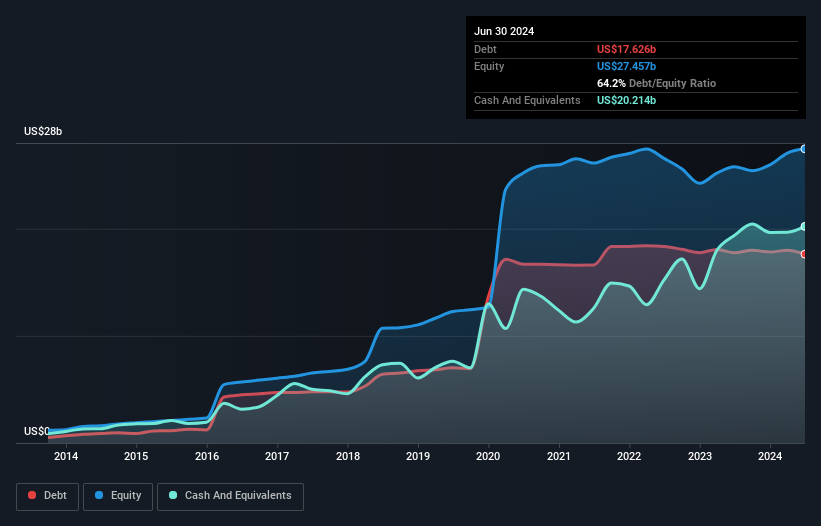
Legendary fund manager Li Lu (who Charlie Munger backed) once said, 'The biggest investment risk is not the volatility of prices, but whether you will suffer a permanent loss of capital.' When we think about how risky a company is, we always like to look at its use of debt, since debt overload can lead to ruin. We can see that Centene Corporation (NYSE:CNC) does use debt in its business. But is this debt a concern to shareholders?
Why Does Debt Bring Risk?
Debt is a tool to help businesses grow, but if a business is incapable of paying off its lenders, then it exists at their mercy. In the worst case scenario, a company can go bankrupt if it cannot pay its creditors. However, a more frequent (but still costly) occurrence is where a company must issue shares at bargain-basement prices, permanently diluting shareholders, just to shore up its balance sheet. Of course, plenty of companies use debt to fund growth, without any negative consequences. The first thing to do when considering how much debt a business uses is to look at its cash and debt together.
View our latest analysis for Centene
What Is Centene's Debt?
As you can see below, Centene had US$17.6b of debt, at June 2024, which is about the same as the year before. You can click the chart for greater detail. But it also has US$20.2b in cash to offset that, meaning it has US$2.59b net cash.

How Strong Is Centene's Balance Sheet?
Zooming in on the latest balance sheet data, we can see that Centene had liabilities of US$32.7b due within 12 months and liabilities of US$23.0b due beyond that. Offsetting this, it had US$20.2b in cash and US$16.5b in receivables that were due within 12 months. So its liabilities total US$18.9b more than the combination of its cash and short-term receivables.
This deficit isn't so bad because Centene is worth a massive US$41.1b, and thus could probably raise enough capital to shore up its balance sheet, if the need arose. But it's clear that we should definitely closely examine whether it can manage its debt without dilution. While it does have liabilities worth noting, Centene also has more cash than debt, so we're pretty confident it can manage its debt safely.
Fortunately, Centene grew its EBIT by 7.8% in the last year, making that debt load look even more manageable. The balance sheet is clearly the area to focus on when you are analysing debt. But it is future earnings, more than anything, that will determine Centene's ability to maintain a healthy balance sheet going forward. So if you want to see what the professionals think, you might find this free report on analyst profit forecasts to be interesting.
But our final consideration is also important, because a company cannot pay debt with paper profits; it needs cold hard cash. While Centene has net cash on its balance sheet, it's still worth taking a look at its ability to convert earnings before interest and tax (EBIT) to free cash flow, to help us understand how quickly it is building (or eroding) that cash balance. Over the last three years, Centene actually produced more free cash flow than EBIT. There's nothing better than incoming cash when it comes to staying in your lenders' good graces.
Summing Up
Although Centene's balance sheet isn't particularly strong, due to the total liabilities, it is clearly positive to see that it has net cash of US$2.59b. The cherry on top was that in converted 115% of that EBIT to free cash flow, bringing in US$2.3b. So we don't have any problem with Centene's use of debt. Of course, we wouldn't say no to the extra confidence that we'd gain if we knew that Centene insiders have been buying shares: if you're on the same wavelength, you can find out if insiders are buying by clicking this link.
If you're interested in investing in businesses that can grow profits without the burden of debt, then check out this free list of growing businesses that have net cash on the balance sheet.
New: AI Stock Screener & Alerts
Our new AI Stock Screener scans the market every day to uncover opportunities.
• Dividend Powerhouses (3%+ Yield)
• Undervalued Small Caps with Insider Buying
• High growth Tech and AI Companies
Or build your own from over 50 metrics.
Have feedback on this article? Concerned about the content? Get in touch with us directly. Alternatively, email editorial-team (at) simplywallst.com.
This article by Simply Wall St is general in nature. We provide commentary based on historical data and analyst forecasts only using an unbiased methodology and our articles are not intended to be financial advice. It does not constitute a recommendation to buy or sell any stock, and does not take account of your objectives, or your financial situation. We aim to bring you long-term focused analysis driven by fundamental data. Note that our analysis may not factor in the latest price-sensitive company announcements or qualitative material. Simply Wall St has no position in any stocks mentioned.
About NYSE:CNC
Centene
Operates as a healthcare enterprise that provides programs and services to under-insured and uninsured families, and commercial organizations in the United States.
Undervalued with solid track record.
Similar Companies
Market Insights
Community Narratives



